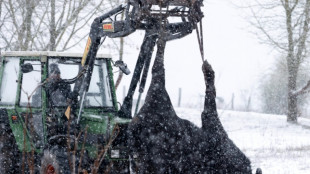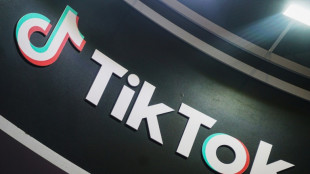
-
 Five things to know about New Glenn, Blue Origin's new rocket
Five things to know about New Glenn, Blue Origin's new rocket
-
Blue Origin set for first launch of giant New Glenn rocket

-
 Dutch police detain hundreds at climate protest
Dutch police detain hundreds at climate protest
-
Germany battles to secure stricken 'Russian shadow fleet' oil tanker

-
 Malala Yousafzai 'overwhelmed and happy' to be back in Pakistan
Malala Yousafzai 'overwhelmed and happy' to be back in Pakistan
-
'Education apartheid': schooling in crisis in Pakistan

-
 Smart glasses enter new era with sleeker designs, lower prices
Smart glasses enter new era with sleeker designs, lower prices
-
Supreme Court looks poised to uphold TikTok ban

-
 2024 hottest recorded year, crossed global warming limit
2024 hottest recorded year, crossed global warming limit
-
Germany reports foot-and-mouth disease in water buffalo

-
 US hikes reward for Maduro arrest after 'illegitimate' swearing-in
US hikes reward for Maduro arrest after 'illegitimate' swearing-in
-
Robots set to move beyond factory as AI advances

-
 Pro-Russian disinformation makes its Bluesky debut
Pro-Russian disinformation makes its Bluesky debut
-
UK gas reserves 'concerningly low', warns biggest supplier

-
 2024 warmest year on record for mainland US: agency
2024 warmest year on record for mainland US: agency
-
Meta policy reversal puts question mark on future of fact-checking

-
 Meta policy reversal puts question mark on furure of fact-checking
Meta policy reversal puts question mark on furure of fact-checking
-
Strong US jobs report sends stocks sliding, dollar rising

-
 US hiring beats expectations in December to cap solid year
US hiring beats expectations in December to cap solid year
-
UK gas reserves 'concerningly low': Biggest supplier

-
 Global stocks mostly fall before US jobs data
Global stocks mostly fall before US jobs data
-
Ubisoft: the 'Assassin's Creed' maker targeted by suitors

-
 Stock markets drift lower as US jobs data looms
Stock markets drift lower as US jobs data looms
-
Pakistan flight departs for Paris after EU ban lifted

-
 Nobel laureate Malala Yousafzai to visit native Pakistan for girls' summit
Nobel laureate Malala Yousafzai to visit native Pakistan for girls' summit
-
AI comes down from the cloud as chips get smarter

-
 Tajikistan bets on giant dam to solve electricity crisis
Tajikistan bets on giant dam to solve electricity crisis
-
Uruguay bucks 2024 global warming trend

-
 Last 2 years crossed 1.5C global warming limit: EU monitor
Last 2 years crossed 1.5C global warming limit: EU monitor
-
Japan 'poop master' gives back to nature

-
 US Supreme Court to hear TikTok ban case
US Supreme Court to hear TikTok ban case
-
US Fed's December rate cut should be its last for now: official

-
 Paris Hilton among celebrities to lose homes in LA fires
Paris Hilton among celebrities to lose homes in LA fires
-
Airbus boosts plane deliveries in 2024

-
 Ubisoft reviews restructuring options, postpones new Assassin's Creed
Ubisoft reviews restructuring options, postpones new Assassin's Creed
-
Lamborghini sets new sales record amidst hybrid push

-
 Lebanon army chief Aoun becomes president after two-year vacancy
Lebanon army chief Aoun becomes president after two-year vacancy
-
US emissions stagnated in 2024, challenging climate goals: study

-
 Lebanon army chief short of required majority in first round of president vote
Lebanon army chief short of required majority in first round of president vote
-
Global stock markets mixed tracking US rates outlook

-
 Lebanon meets to finally elect president after two-year vacancy
Lebanon meets to finally elect president after two-year vacancy
-
Celebrities flee Los Angeles fires, lose houses as Hollywood events scrapped

-
 Japan startup hopeful ahead of second moon launch
Japan startup hopeful ahead of second moon launch
-
Ukraine allies to hold last defence meet before Trump takes office

-
 Myanmar military adopts anti-junta fighters' drone tactics
Myanmar military adopts anti-junta fighters' drone tactics
-
CES tech looks to help world's aging population

-
 Rubber tappers forge sustainable future in Amazon
Rubber tappers forge sustainable future in Amazon
-
US astronauts upbeat seven months into eight-day mission

-
 Extreme weather, suburban sprawl fuel LA's wildfires
Extreme weather, suburban sprawl fuel LA's wildfires
-
Political chess or true beliefs? Zuckerberg's surprise Trump pivot

| NGG | -3.3% | 56.13 | $ | |
| SCS | -3.01% | 10.97 | $ | |
| RIO | 0.36% | 58.84 | $ | |
| VOD | -1.99% | 8.05 | $ | |
| BTI | -2.34% | 35.9 | $ | |
| RBGPF | 100% | 60.49 | $ | |
| BP | 0.54% | 31.29 | $ | |
| GSK | -1.99% | 33.09 | $ | |
| RYCEF | -0.42% | 7.07 | $ | |
| CMSC | -0.79% | 22.92 | $ | |
| BCC | -1.31% | 115.88 | $ | |
| BCE | -2.92% | 22.96 | $ | |
| RELX | -0.86% | 46.37 | $ | |
| CMSD | -0.65% | 23.25 | $ | |
| JRI | -1.16% | 12.08 | $ | |
| AZN | 0.64% | 67.01 | $ |

European businesses brace for Trump return
The return of Donald Trump and his protectionist agenda to the White House will likely rock US trade relations with the world, including Europe.
Here is a look at how sectors of the European economy could be affected after Trump pledged 10 to 20 percent tariffs on imported goods from everywhere except China, which would face a 60 percent duty:
- Tough road for cars -
More than one million new vehicles cross the north Atlantic every year, according to the trade association uniting European auto manufacturers.
German carmakers are particularly exposed as the United States is its second export market after China, where they are already reeling from falling sales.
German auto manufacturer association VDA warned Wednesday that "any change in the framework conditions can affect the economic situation of the industry and thus also employment in Germany, but also in the USA."
That is because automakers have factories in the United States that would help them avoid extra levies.
BMW head Oliver Zipse noted that his group has a large production facility in South Carolina, where its best-selling SUVs are assembled, proving "some natural cover" against possible tariffs.
Francois Roudier, secretary general of the International Organization of Motor Vehicle Manufacturers, echoed that sentiment.
"Trump will not crack down on foreign automakers established in the South," he said. "The Germans already have factories there; they will be encouraged to manufacture vehicles there."
- Bad for chemicals? -
The chemical industry, dominated by German giants such as Bayer and BASF, also faces an uncertain future in the United States.
The United States is the most important export market for German chemical and pharmaceutical products outside the EU.
France, for its part, exported more than 17 percent of its pharmaceutical products to the United States in 2022, its largest market outside Europe.
"We find that the pharma sector is particularly exposed, especially in Ireland, Switzerland, Belgium, Denmark and the UK, but we do not expect a trade shock on their products," according to experts at Allianz.
- Bad taste for food -
Europe's agri-food business has bad memories from the first Trump term, when he imposed 25 percent tariffs on wine, cheese and cognac.
The United States is the top export destination for French wine.
France's export-dependent cognac makers, already hit by Chinese tariffs, now fret over the prospect of new US levies.
"We just took a big hit with China, and now it's the United States," said Sabine de Witasse, who took over one of the last family-run cognac operations using a wood-fired boiler in the southwest region of Charente 30 years ago.
"My main client conducts almost all their business internationally, in China and the United States, so there will inevitably be repercussions," she said.
Spain's olive oil makers, the world's top exporters, were hit with additional tariffs during the first Trump presidency.
The World Trade Organization deemed the tariffs illegal in 2021 but the United States has yet to follow the WTO ruling.
Spanish olive oil exports have tumbled by 70 percent since 2019.
- Energy under fire -
Trump's victory will be a boon for the oil and gas industry while possibly hurting growth of renewable energy.
"Anyone who's into renewables, and Europe is a lot more than the US on that, will suffer," said Antonio Fatas, economy professor at the French business school Insead.
"I think there's going to be much less demand from the US from these type of services," he said.
Trump is particularly opposed to offshore wind farms.
"One of the points that obviously we have in mind when we consider the new administration is really offshore wind," said Catherine MacGregor, chief executive of French energy firm Engie.
Engie has three offshore wind projects under development in the United States.
"Potentially one could imagine that a moratorium could be put in place. And we'll have to see," she said.
But, she added, "we believe this is something that obviously Engie can live through."
burs-lem/lth/gv
P.Kolisnyk--CPN
